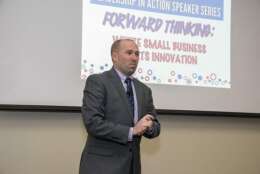Cybersecurity
-
An important term ought to be in every cybersecurity practitioner's lexicon: Adversary tradecraft. Dmitri Alperovitch at Crowdstrike joined Federal Drive with Tom Temin in studio for more details.
April 03, 2019 -
The Census Bureau has shifted its focus for 2020 to scaling up operations to count more than 300 million people living in the United States.
April 02, 2019 -
In today's Federal Newscast, an IG report said the FBI’s current notification system lacks complete and reliable data, making it harder for the agency to determine whether all cyber-crime victims had been informed.
April 02, 2019 -
Michael Daly, CTO for cybersecurity at Raytheon and Russ Schrader, executive director of the National Cyber Security Alliance, explains that developing comprehensive playbooks will help unify government and industry security decision-making.
April 01, 2019 -
The Defense Department will audit contractor cybersecurity in the next year and a half, says Ellen Lord, DoD undersecretary for acquisition and sustainment.
March 29, 2019 -
In today's Federal Newscast, two senators want to reverse steps Congress took last year to begin a comprehensive review of medical facilities at the Veterans Affairs Department.
March 29, 2019 -
While the Census Bureau expects more than 60 percent of respondents will answer the decennial count through its website, it's going to great lengths to ensure the website can withstand a major volume of traffic.
March 28, 2019 -
Lawmakers say a decrease in funding for Energy's 2020 budget could hurt "critical" energy and national security programs, as well as global competitiveness. Secretary Rick Perry defends cuts, claiming the agency is becoming more sustainable with its investments.
March 27, 2019 -
Attivo Networks CTO Tony Cole joins host John Gilroy on this week's Federal Tech Talk to discuss how "engagement-based attack analysis" can help federal agencies prevent cyber threats from malicious actors already inside their networks.
March 27, 2019 -
Since its inception in 2013, the federal government’s Continuous Diagnostic and Mitigation program (CDM), led by the Department of Homeland Security, has helped agencies discover up to 50 percent more assets inside their systems than they were previously aware of. And they’re able to do it in real time.
March 26, 2019 -
In today's Federal Newscast, the Veterans Affairs Department's inspector general released its review of the agency's implementation of the new Forever GI bill.
March 25, 2019 -
In a recognition that smaller firms don't have the infrastructure to defend themselves against sophisticated attacks, DoD will experiment with a secure cloud approach to defending sensitive information.
March 25, 2019 -
Steve Wallace, a systems innovation scientist in the Emerging Technology Directorate at the Defense Information Systems Agency, said the agency soon will choose vendors to develop a prototype to protect the network and data from attacks that come through web browsers.
March 25, 2019 -
Attracting in-demand cybersecurity talent to government service could be as simple as retraining current federal employees for the jobs of the future.
March 22, 2019 -
Savvy organizations have long turned to the National Institute of Standards and Technology for its detailed guidance publications on all facets of cybersecurity, and updates could be on the way.
March 22, 2019
















